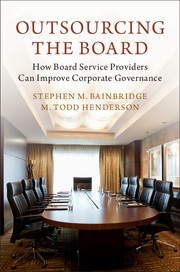Book contents
- Outsourcing the Board
- Outsourcing the Board
- Copyright page
- Dedication
- Contents
- Preface
- Acknowledgments
- Introduction
- Part I Corporate Boards
- 1 A Brief History of the Board
- 2 What Do Boards Do?
- 3 Grading Boards
- 4 Why Boards Fail
- Part II The Board Service Provider
- Part III Legal Issues
- Part IV BSPs and the Frontiers of Corporate Governance
- Part V Concluding Thoughts
- Index
3 - Grading Boards
from Part I - Corporate Boards
Published online by Cambridge University Press: 19 April 2018
- Outsourcing the Board
- Outsourcing the Board
- Copyright page
- Dedication
- Contents
- Preface
- Acknowledgments
- Introduction
- Part I Corporate Boards
- 1 A Brief History of the Board
- 2 What Do Boards Do?
- 3 Grading Boards
- 4 Why Boards Fail
- Part II The Board Service Provider
- Part III Legal Issues
- Part IV BSPs and the Frontiers of Corporate Governance
- Part V Concluding Thoughts
- Index
Summary
- Type
- Chapter
- Information
- Outsourcing the BoardHow Board Service Providers Can Improve Corporate Governance, pp. 57 - 64Publisher: Cambridge University PressPrint publication year: 2018
- 1
- Cited by



